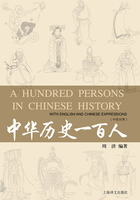
20 Zhuangzi
Laozi’s Successor

Zhuangzi lived in the Warring States Period, with his family name as Zhuang, given name as Zhou, and people didn’t know much of his life story. Zhuangzi was the successor of Laozi, and wrote a book Zhuangzi, also North China Classics to further develop Taoism philosophy.
Zhuangzi had a famous theory: “Taoism made everything equal”, saying: “The most longevity man was a die infant, while the shortest-lived man was Pengzu (a legendary man aged 800 years); The largest stuff in the world was a thread of hair, while the smallest stuff in the world was Taishan Mountain”. It was because Tao alleged both space and time were borderless, and human life was trivial and negligible. Zhuangzi had written many beautiful and popular fables and idiom stories to explain his philosophical ideas, and his strange concepts as well as beautiful rhythmic writing-style had won appeals among intellectuals in history.
But Zhuangzi had extended his theory to “cultivation of super man”. He said: “a man, through self-cultivation, could make himself an immortal, staying away from live and death, staying away from past and present, staying away from heaven and earth. He could feel no heat from mountain fire, feel no cold from frozen sea, feel no terror amid thundering and lightening, and could hang out riding on winds and clouds traveling over mountains and seas.” “An immortal could feel no difference between right and wrong, between success and failure, between dreams and awake, between alive and dead, between past and present.” So, Zhuangzi had made his theory appear illusory and supernatural.
But in the book Zhuangzi, there were stories actually implying some enigmatic truth. He said: A yard of stick could be divided endlessly when cut it by half everyday. Another fable said: There was a marsh stream in some remote place where swam many fish with their heads as huge as 3 or 4 mountains. A super fisherman came and captured five of them and carried them away.